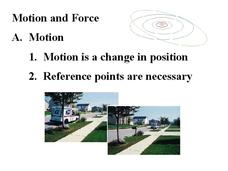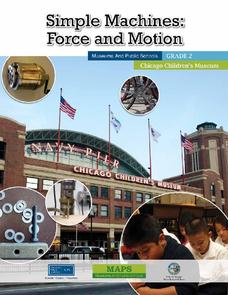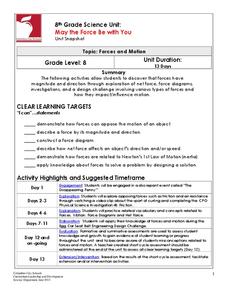Physics Classroom
Recognizing Forces
A common complaint among physics scholars studying Newton's laws of motion concerns drawing free-body diagrams. To practice the required pre-requisite skills for free-body diagrams, individuals identify which forces act in specific...
K5 Learning
Force
Follow-up a physical science lesson with a reading passage that connects sports to force. Readers respond to six short answer questions that requires them to use the text as a basis for the answers.
Curated OER
Motion, Forces, Energy and Electricity
What a wonderful way to explore motion and forces! Learners design a catapult, after watching a video and discussing types of catapults. This is a comprehensive and complete lesson with links to supplementary resources.
Concord Consortium
Charge Intensity and Electric Force
Looking for a quick way to supercharge your electricity and magnetism unit? Assign a very responsive interactive designed to illustrate the relationship between charge, electric field, and the resulting forces. Learners experiment with...
Teach Engineering
Fairly Fundamental Facts About Forces and Structures
Don't twist and turn looking for a resource. The first installment of a six-part series teaches young engineers about the five fundamental forces of compression, tension, shear, bending, and torsion. These forces help explain different...
Curated OER
On The Go! Forces and Motion
Students create a car using physics. In this forces and motion lesson plan, students create a car and test which changes in design change the performance of the car. Students complete a graphic organizer with the different...
Curated OER
Quiz-Type of Forces
In this types of forces quiz worksheet, learners complete an on-line quiz, clicking on questions and matching answers, scoring 1 point for each correct answer. A printed version is available.
Curated OER
Forces
An interesting worksheet on force and inertia is here for your young scientists. The worksheet is meant to be used as a vehicle for oral interviews. There are three questions about force and seven questions regarding intertia. Very good!
Curated OER
Being Forceful
Young scientists consider the forces of push and pull, start and stop, and try to categorize each one correctly. There are five cartoon drawings of kids performing an activity. Learners must write push or pull, and start or stop in the...
Curated OER
Balanced Forces
Examples and practice questions will help real-life understanding of the Principle of Moments concept. These great slides define the types of levers and pivots, and then give examples of the typical seesaw situations that help the...
Curated OER
Motion and Force
All the main concepts in motion and force are covered in this presentation. Each slide is a great summary and will appeal to your students with a clean design and images that should seem relevant. Definitions of speed,...
Curated OER
Identify Types of Forces
In this types of forces quiz activity, students complete an on-line quiz, clicking on questions and matching answers, scoring 1 point for each correct answer. A printed version is available.
Chicago Children's Museum
Simple Machines: Force and Motion
Get things moving with this elementary science unit on simple machines. Through a series of nine lessons including teacher demonstrations, hands-on activities, and science experiments, young scientists learn about forces, motion,...
Broward County Public Schools
Force and Motion
Get the ball rolling with this upper-elementary science unit on forces and motion. Offering over three weeks of physical science lessons, this resource is a great way to engage the class in learning about simple machines, friction,...
Curated OER
Identify the Types of Forces
For this physical science worksheet, students complete an 8 question multiple choice online interactive quiz about the types of forces and the laws of motion. The quiz may also be printed and completed on paper.
Curated OER
Intermolecular Forces
In this intermolecular forces worksheet, students read about the two types of forces: dispersion forces and dipole-dipole forces. Students then complete 2 problems based on what they read.
Curated OER
Forces Crossword Puzzle
In this science worksheet, students examine the words and concepts related to forces in order to solve the crossword puzzle. The new vocabulary can be acquired this way.
Beyond Benign
Green Chemistry, Biomimicry and Intermolecular Forces
Did you know plywood was invented around 3500 B.C.? It was also featured as something new and unusual at the 1905 World's Fair. Scholars complete an experiment with various types of adhesive. Then they read three case studies and...
Curated OER
Centripetal Force
In order to investigate cetntripetal force and angular momentum, youngsters compare the motion of erasers hung from a string. It is not clear what type of Amish toy is needed in the warm up activity, so you may not be able to use it. The...
Columbus City Schools
May the Force Be with You
You won't have to force your classes to complete these engaging activities! Through exploration, young scientists learn that force has both magnitude and direction. They draw force diagrams, investigate force models, and complete a...
Curated OER
Types of Forces
In this types of forces quiz worksheet, learners complete an on-line game, clicking on questions and matching answer cards and scoring 1 point per correct answer. Printable version available also.
Science Geek
Intermolecular Forces of Attraction
Chemists love London (dispersion forces)! Presentation begins with an explanation of intermolecular forces including hydrogen bonding, dipole-dipole attraction, and London dispersion forces. It also covers polarity and the relative...
Teach Engineering
May the Force Be With You: Thrust
Force the plane through the air. The lesson introduces the force on an airplane that makes it go forward. Pupils learn how Newton's laws of motion apply to flight in the eighth segment of a 22-part unit on flight.
Curated OER
Force and Motion
Students experiment with force and motion. In this force and motion lesson, students test gravity using a variety of objects. Students rotate through a series of stations which use force, motion, friction, and inclines. Students predict...























